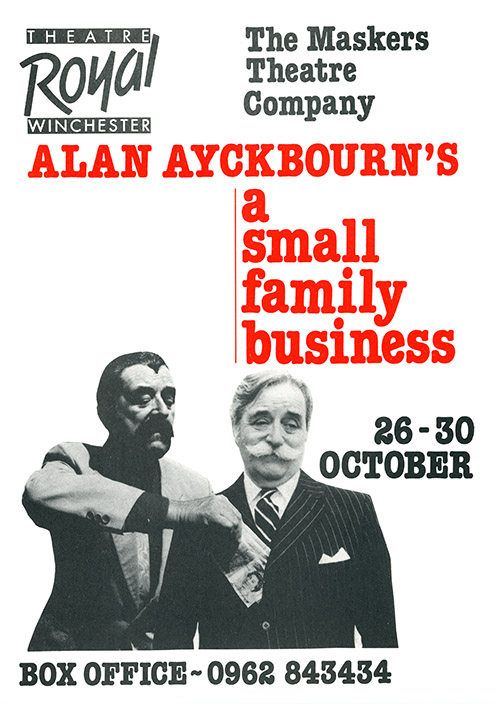Theatre Royal, Winchester
on26th to 30th October 1993

The Writer on His Work
“Eighty per cent of the productions I’ve seen of my plays have always been far too boisterous: that’s the British idea of having a good time ..... I’d love to write a truly hilarious dark play.”
“At the moment, touch wood, ideas just pop out: as soon as I get one out, another one arrives, so that is nice, but there is always the fear that it won’t happen, that there will be The Blank Sheet of Paper .... The best part of my work is not the clapping, it’s the feeling at the end of the evening, that you have given the most wonderful party and these five hundred strangers who came in are feeling better .... I don’t know but they are sort of unified into a whole and that is marvellous”
“Significant Theatre, Serious Theatre, are deadly words.They should be banished, this feeling that unless there is a glum silence in the auditorium, nothing meaningful can be happening...”
“I made a vow when I was an actor with nothing to do except wait for my line on p.49, that in my plays there would be no butlers, waiters or soldiers with spears.”
“I now realise that I have a double obligation: to an audience - one has to entertain them as a practical writer; but one has to give them something else besides.”
Alan Ayckbourn is popular. He is prolific. And he writes comedies.For all those reasons he is still seriously underrated. He is constantly written about as if he were a boulevard lightweight whereas he shows an increasing capacity to handle the darker side of human nature while retaining his technical adventurousness.Looking at his plays in detail, one notices the recurrence of certain themes (disillusionment with’marriage, horror at masculine insensitivity towards women, dislike of do-gooders and bullish opportunists, sympathy with the feckless and incompetent) within a constantly varying comic format.Emotionally, he has staked out his own particular territory: technically, he is always trying to push the frontiers outwards.
For his audiences that progress is particularly hard to follow. To the casual eye, it seems as if Ayckbourn sprang fully-armed from the head of some theatrical Zeus in 1967 with a hit comedy, Relatively Speaking. It ran for 355 performances at the Duke of York’s and ranked as the most mature and accomplished West End debut since Terence Rattigan arrived with French Without Tears in 1936. But, of course, the truth is vastly more complicated than that. Not only had a previous Ayckbourn play, Mr. Whatnot, enjoyed a brief, mildly disastrous run at the off-West End Arts Theatre in 1963; but from 1959 on Ayckbourn had had a number of earlier plays produced both at The Library Theatre, Scarborough and at the Victoria Theatre, Stoke-on-Trent. He had, in fact, paid his dues.
Nearly 30 years on his 42nd play, Wildest Dreams, is part of The Royal Shakespeare Company’s winter season at The Barbican: our theatre’s Master Craftsman of Comedy is as popular and as prolific as ever.
| Cast (in order of appearance) | |
| Poppy | Jan Shrouder |
| Ken | Douglas Coates |
| Desmond | David Pike |
| Harriet | Hazel Burrows |
| Yvonne | Jean Durman |
| Cliff | Sean McCann |
| Anita | Sarah Spencer |
| Uberto | Don Marr-Skopf |
| Tina | Dawn Alford |
| Roy | John Carrington |
| Samantha | Katrina Dowding |
| Jack | Harry Tuffill |
| Lotario | Frank Drompos |
| Orlando | Sam Porkfrond |
| Giorgio | Rod F. Karmpson |
| Vincenzo | Mark Ponsford |
| Benedict | Robbie Carnegie |
| For the Maskers | |
| Designed & Directed by | Ken Spencer |
| Technical Director | Ron Tillyer |
| Stage Manager | Kirsten Shiell |
| Assistant Stage Manager | Emma Carrington |
| Set Construction | Chris Finbow, Douglas Shiell, Roger Lockett, Geoff Cook, Brian Langford |
| Lighting Design | Ron Tillyer |
| Sound Recordist | Lawrie Gee |
| Properties | Ella Lockett |
| Wardrobe Mistreus | Suzanne Dowding |
| Make-Up Design | Jacquie Block |
| Publicity & Marketing | Michael Patterson |
| Language Coach | Paolo Magnaschi |
| Decor Assistant | Jan Ward |